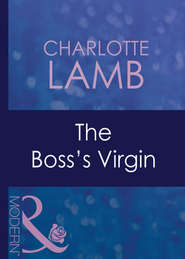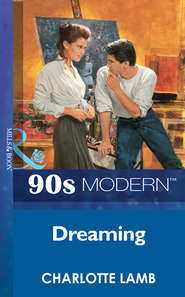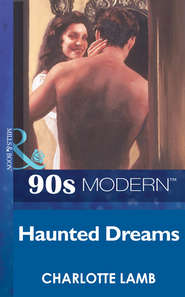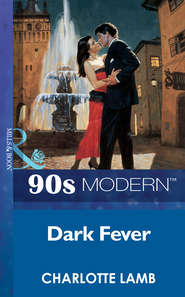По всем вопросам обращайтесь на: info@litportal.ru
(©) 2003-2025.
✖
Angry Desire
Автор
Год написания книги
2018
Настройки чтения
Размер шрифта
Высота строк
Поля
She turned hurriedly, almost falling over one of the expensive leather cases standing near the door, packed ready for departure. Gabriella stared down at them. Her cases had been packed since yesterday, to be collected on the day itself and put into the car which would take them to the airport.
Everything had been carefully planned far ahead, organised down to the last detail by Stephen’s secretary, a capable middle-aged woman who had worked for him for years.
Gabriella’s passport was in her handbag. Stephen had told her that she needn’t bother to bring any money with her, but that had ruffled her sense of independence. She and Stephen were still arguing about her job—he wanted her to stop work when they were married, but she wanted to retain the freedom of being responsible for herself, having her own life outside her home and marriage.
So she had refused to let him give her money before they were married; it would have made her feel as if she was being bought. In her handbag she had a folder full of American dollars which she had got from her own bank; it hadn’t left her much in her deposit account, but at least it was hers, so she could take it with her now.
She only had to pick up her cases and walk out, she thought. She didn’t have to go through with it. She could just vanish.
Where, though? She had to go somewhere. Her mind worked feverishly. She could take a plane to…No, if she went by air she would have to hire a car and it would be too easy for him to check her name on passenger lists at the airport, and check with car-hire firms.
But would he look for her?
She shivered. He would be so angry. She had seen him lose his temper once when his secretary had had to confess to having mislaid a vital fax. She didn’t want that black rage turned on her, and this was much worse than some office mistake. Stephen was going to lose face in a very public way. He would be humiliated, made to look a fool.
He would probably never want to set eyes on her, or even hear her name again.
She choked back a half-hysterical laugh which was also half a sob. No, not him. That much she did know about him. He would want to find her and…He’ll kill me! she thought, her stomach churning.
Think, think! she told herself, trying to clear her weary brain. She had her car. She could just drive out of London and head somewhere quiet and far away…Cumbria, maybe? Or the far west of Cornwall? Or the Fens? Britain was full of secret, remote places, without railway stations, or hotels, or shopping centres—little villages lost in the countryside, where nothing much ever happened or changed, where few people ever visited.
Oh, but wherever she went in Britain people would read newspapers. She wasn’t famous, but Stephen was wealthy and well-known. Some reporter might pick the story up and sell it. Then there would be pictures of her appearing, she would be recognised, and someone unscrupulous who wanted to earn some easy money might ring the Press and tell them where she was, and they would tell Stephen.
No, she must go abroad, as far away as possible. Foreign newspapers wouldn’t bother with the story. France was closest; she could easily lose herself in a country as large and as underpopulated as France, but she only knew a little French, and her accent was so atrocious that whenever she tried to say anything in shops or markets crowds of locals gathered to hear her and laugh their heads off at the way she mangled their language.
She didn’t have enough money, either, to support herself for very long. She would have to get some sort of work wherever she went, and for that she would have to be able to speak the language. She could get a job in a hotel, maybe, or a restaurant. She was a good cook—she had been well-trained—and they wouldn’t insist on references if she offered to show what she could do. But she wouldn’t get a job if she couldn’t speak the language.
It had to be Italy, then, in spite of the fact that that was where Stephen would expect her to go. Italy, too, was a large country—surely she could hide herself in it somewhere? She would drive down to Dover and buy a ticket for the Channel ferry using cash, making it harder to trace her than if she booked a ticket in advance—she wouldn’t show up on the computers until after she had left. Once in France she would make her way on the autoroute into Italy by the most direct route. If she left now she could be in France before Stephen even knew she had gone.
Her mother had been Italian, and Gabriella had been born there and lived there until she was eleven and her mother had died. She had dual nationality and spoke the language fluently. She would not stand out in Italy; she could easily be taken for a native.
She wouldn’t be able to go anywhere near Brindisi, where her mother had come from—there were only distant relatives living there now, but Stephen knew about them, and would look there first. She would make for the northern part of Italy, as far away from Brindisi as possible.
She hurried into her bathroom and, dragging her nightdress over her head, stepped into the shower. The sting of the water sharpened her mind; a few minutes later she towelled herself dry and began to dress.
First she put on black lace panties and a matching bra, and then old blue jeans and a thin blue cotton sweater. She didn’t want to be noticed; she would pass without comment in her old clothes, and they would be comfortable for travelling.
Her long black hair she put up in a knot at the back of her neck, but she put on no make-up, not even a touch of lipstick. She would wear dark glasses as she drove and keep them on as she crossed the Channel—that would help keep her anonymous.
She mustn’t be recognised anywhere on the way because Stephen was going to be right behind her, and the very thought of him scared her stiff.
Oh, God, why didn’t I face it long ago? she inwardly wailed, shivering.
What would he do to her if he caught up with her? Last night she had seen the real Stephen, the nature he had hidden from her all these months. She wasn’t blinkered any more—she knew she could expect no mercy from him.
She had to let him know in advance, even so; she couldn’t just run away and leave him standing at the altar not knowing what had happened to her. She sat down at a table and scribbled a note to him. There was no time to pick and choose her words, to break it tactfully; she simply told him that she was very sorry, please to forgive her, but she couldn’t go through with it, and was going away.
She began to fold the note, then on an afterthought added a few more lines.
Please let everyone know and make my apologies. Try to understand, Stephen—I’m sorry, I just can’t marry you after all. I thought I could, but I can’t. I’m sorry, I can’t explain.
She signed it with her name in a scrawl then read it and groaned. It was incoherent—he would think she’d been drunk when she wrote it, but it was the best she could do, and there was no time to try again.
She would put it into his mail-box at the apartment block on her way out of town—she knew the porter delivered all mail at eight o’clock, which was around the time the post office delivered it.
The wedding was due to take place at eleven-thirty—Stephen would have time to cancel the service and the reception before people began arriving. At least he would have help—he had a huge secretarial team in his offices; they could make the phone calls for him. Even so, she flinched from the thought of the chaos that was going to follow: the presents that would have to go back, the three-tiered bridal cake that nobody would want now, all the food for the reception.
It was going to be embarrassing and humiliating for Stephen and she felt a weary sense of shame at doing this to him as she stared down at the envelope on which she had written his name and address.
For a second she couldn’t decide what to do, then the panic began to burn in her stomach again and she swung away. She could not go through with it, that was all. Whatever the consequences, she could not marry him.
To calm herself, she concentrated on little details—went through her handbag to check that she had everything she would need, then put on a light summer jacket—black and white striped. Picking up her car keys, she was about to let herself out of the flat when she saw some letters on a table; she had written them yesterday morning, and forgotten to post them. Automatically she picked them up and was about to put them into her bag when her eye fell on the address on the top letter.
At that second, inspiration hit her. Paolo! In his letter he had said that he was staying at a villa on Lake Como; he would be there all summer, until September; he was painting a series of frescos on the walls of a small private theatre in the villa, which was owned by a world-famous opera director who liked to try out future productions in his own theatre.
It was like a signpost blazing her path. That’s it, I’ll go to the Italian Lakes, she thought. They’re hundreds of miles north of Brindisi. Stephen isn’t likely to think of looking there—why should he? I’ve never told him how important Paolo is to me.
Dropping the envelopes into her handbag, she let herself out of the little flat on the ground floor of an old Victorian house. Her car was parked in what had once been the front garden; now, covered in asphalt, it served as a car park for the tenants of the flats into which the house had been divided.
It was five-thirty in the morning; London was grey and dim, with few cars around, and even fewer people. The street-lights glowed yellow as she headed south towards the river. She pulled up beside a red postbox which she saw on a corner, and posted all the letters except the one to Paolo. There was so little traffic that it only took her ten minutes after that to reach the apartment block facing Hyde Park with views of the cool green shade under the trees.
It had been one of Stephen’s most prestigious projects, built five years ago right in the heart of London’s most expensive and fashionable area, with marvellous views. Even a small flat there cost the earth.
Stephen had moved into the penthouse apartment as soon as the building had been completed; he had always meant to live there, he had told her. He had worked on the specifications of the penthouse with the architect with his own tastes in mind, and had chosen the décor, creating a perfect home for himself.
Beyond his long, beautifully furnished lounge lay a broad terrace garden; it even had small trees growing in pots, and shrubs and flowers which breathed fragrance at night. She had loved walking out there at night, watching London far below, the sound of it muted, unreal.
Being so close to the park was wonderful too, almost giving one the feeling of being in the country. On hot days you could get cool in the shade of the trees, have a picnic, or row on the Serpentine. Stephen rode in Hyde Park at weekends, on a big black Arab horse which he kept in stables near by, and in the early mornings he jogged in a tracksuit to keep fit, following the twisting paths under the trees for half an hour.
It was lighter when she parked outside the apartment block, knowing that there were unlikely to be police around at that hour. It was the work of a minute to run across the pavement and drop her letter into the chrome letter-box on the front of the locked bullet-proof glass doors of the block.
The porter seated behind his desk looked up, recognised her, looked startled, but immediately gave a polite smile, and stretched his hand out ready to press the button that would open the doors electronically, if she wished, but she shook her head and turned away.
Behind her she sensed him walking towards the doors to collect the letter she had delivered.
Please don’t take it up at once! she thought, her heart going like a steam-hammer.
He wouldn’t, though, surely? Not at this hour! He would keep it and take it up with the rest of Stephen’s mail.
Although it was cool she was sweating as she got back into her car. She slammed the door, put on her seatbelt, and then risked a glance upwards to the soaring top of the forty-storey block, to where the penthouse rose against the early morning sky.
She had expected the high, wide windows to be dark too, but they blazed with light. Shock hit her. Stephen must be awake. Couldn’t he sleep either? It hadn’t occurred to her that he might be nervous too; might have doubts or uncertainties.
A shadow moved at one of the windows and her throat closed in fear. Was that him? Or was she imagining it? It was so far up that she couldn’t be sure. Was he looking out? Looking down? What if he saw her? What if he had spotted the car? Was he watching her, wondering what she was doing out there, and if she was coming up? Would he come down to find out if she had left a message?
Her hands shaking, she started her engine and stepped on the accelerator, shooting away as if the devil himself were after her.
She drove far too fast in sheer panic but there were no police cars around to notice her. She shot through comparatively empty streets down to the softly moving Thames with its glittering reflections of light from the embankment and the high-rise office blocks on each bank. A few moments later she was across Westminster Bridge, and driving into the southern suburbs, unnaturally quiet at this hour, the normally crowded roads almost empty, just the odd car passing her, and a bus lumbering into the city with a few sleepy passengers, workmen on their way home after a night shift.











